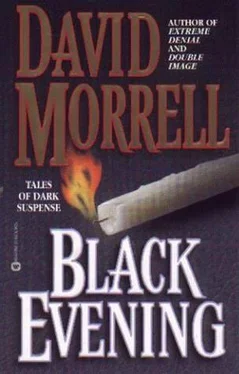David Morrell - Black Evening
Здесь есть возможность читать онлайн «David Morrell - Black Evening» весь текст электронной книги совершенно бесплатно (целиком полную версию без сокращений). В некоторых случаях можно слушать аудио, скачать через торрент в формате fb2 и присутствует краткое содержание. Жанр: Ужасы и Мистика, на английском языке. Описание произведения, (предисловие) а так же отзывы посетителей доступны на портале библиотеки ЛибКат.
- Название:Black Evening
- Автор:
- Жанр:
- Год:неизвестен
- ISBN:нет данных
- Рейтинг книги:4 / 5. Голосов: 1
-
Избранное:Добавить в избранное
- Отзывы:
-
Ваша оценка:
- 80
- 1
- 2
- 3
- 4
- 5
Black Evening: краткое содержание, описание и аннотация
Предлагаем к чтению аннотацию, описание, краткое содержание или предисловие (зависит от того, что написал сам автор книги «Black Evening»). Если вы не нашли необходимую информацию о книге — напишите в комментариях, мы постараемся отыскать её.
Black Evening — читать онлайн бесплатно полную книгу (весь текст) целиком
Ниже представлен текст книги, разбитый по страницам. Система сохранения места последней прочитанной страницы, позволяет с удобством читать онлайн бесплатно книгу «Black Evening», без необходимости каждый раз заново искать на чём Вы остановились. Поставьте закладку, и сможете в любой момент перейти на страницу, на которой закончили чтение.
Интервал:
Закладка:
"I know you're in here, Andrew! Come out now! Don't make me look for you!"
The house was silent, grotesque as I flashed my light and charged in toward the parlor.
"Dammit, Andrew! If you've harmed her, I swear I'll punish you, the way you punished all those children!"
In a frenzy, I yanked at the stacks of newspapers.
"Chief, you'd better get control," the deputy said.
But I kept pulling, yanking, and the one side of the room was no good. I swung toward the other.
"Help me!" I yelled to the deputy, the doctor.
And we found him, Andrew, in the music room, or rather in a room within a room, a room whose walls were stacks of newspapers. He was in there, almost eighty, brittle and yet strangely spry. He glared up at me, smelling old, like ancient newspapers, squirming to hide his secret, but I grabbed his shirt and yanked him to one side, and there she was, another young girl, dressed in clothing from the twenties, gagged and bound and staring, wide-eyed, fearful, for it had been Andrew who grabbed the children. He had never left. He'd only lost his mind. Agnes, to protect and preserve him, hid him. But each time he killed a child, her loyalty had weakened, until at last, faced with awful choices, she had hanged herself, unable to reveal him.
I'd guessed that he was there because that phone call had informed me of another missing child, a child who from fright was now white-haired, always would be, and if Agnes hadn't done it, who else but Andrew? Yes, that girl, an adult now, is white-haired, I can prove it, for that small child was my daughter, and she sometimes seems to know me when I visit her on weekends.
A final story about a house, "The Hidden Laughter" was published the same year as "Black Evening": 1981. Ever since I attended modern-poetry courses in college, I've been haunted by T.S. Eliot's Four Quartets and in particular the first section, "Burnt Norton," its eerie otherworldly tone, the sense it creates of falling through and out of time. When my family and I first arrived in Iowa City, we lived in a small, pleasant ranch house, which we eventually outgrew. But even after we moved to a larger house in a different section of town, we often drove back to the old neighborhood and paused to savor the memories associated with our six years in that house. It represented our post-college youth. We associated it with the excitement and difficulty of getting started in the world. I got to wondering if, under the right circumstances, a house could be loved enough that a person might develop a mystical bond with it, to the exclusion of everything else. The house, which I continue to remember fondly, is described in this story.
The Hidden Laughter
There's a line somewhere in an Eliot poem, "Burnt Norton" I think, about unheard music and leaves being full of children, hidden in excitement, laughing. I have sensed that music, almost seen those children, not in leaves it turns out, in a house, though, where I used to live, except that all this was so long ago that now I think of "I" as "he" and how he turned to see her walking toward him.
She was looking very puzzled. "Something's funny at the house we sold," she told him. "All the neighbors say there are children inside laughing."
What was odd, of course, was that he'd locked it when they'd moved out, and besides, there were few children in that neighborhood, all of them accounted for. "I think I'd better look," she said. She had a key, you see, until the new owners came to take possession, just in case some trouble happened in the meantime, and she loved that house, the one that she'd been married in, so she was going back to take a final look. He didn't think she ought to, but he couldn't talk her out of it. Because he was working on some bookshelves, he just told her that he'd wait to hear about the laughter, which he knew would be imaginary. So she left, and that's the last he ever saw of her.
This happened in the morning. He postponed his lunch and waited for her. Finally he ate. He figured she was visiting some friends in the old neighborhood, and after all, the kind of marriage that they had, they both were free and easy, so he didn't worry. Then the evening came, and it was time for supper. Still she didn't come, and now he did begin to worry. After he made a meal and fed his children, he began to phone, but no one at the old neighborhood had seen her. Not since lunch at least.
She'd checked the house, he was told, and as he had expected, there was nothing. Then she'd visited some friends, again as he'd expected. After lunch she'd gone back to the house, just to see it one last time, and people in the neighborhood had gone on with their business. But yes, wait a minute, yes, her car was still parked in the driveway down there, and she must be with some other friends. When he made more calls, however, he learned that no one else had seen her, and he worried even more. He thought that maybe she'd had some trouble with the car and left it. But she would have phoned him then. That much was certain. He got a sitter for the children and drove over.
The house was much the same as he'd left it. Oh, the grass was somewhat long, the shrubs in need of a little trimming, but except for that and dust on the outside windows, it looked as if they still lived there. As he stood at the curb and surveyed the place, he felt a yearning: for his youth, for the days when he and she were just beginning. Don't mistake. The place was not impressive. Oh, acceptable but nothing more. A single-story ranch house with a lush maple tree on the right, a stunted plum tree on the left, and in the middle an overhang that formed a porch. What they used to call low-income housing when a house was something that ambitious, saving people could afford. A lot of things had changed since then, more money and more complications. That moment as he stood there, watching, brought back fond memories of early days and innocence.
He walked up toward the house, and of course the door was locked. That was exactly like her. She had felt so close to what the house had meant to her that she would never have left it unsecured. He had a key as well, though, and he turned it, going in. There was an echo off the bare walls and the floor. The cabinets that they'd built, the hardwood floors that they'd varnished, these brought back a sequence of quick images, the two of them starting their marriage.
He waited, and he listened. "Honey?" But he really didn't think there'd be an answer. He walked through the living room to the kitchen, looking for some sign that she had been there. But the kitchen was the way it should be, and he continued to the stairs down to the basement. Maybe she had fallen. When he took a breath and opened the door to look down, though, the concrete floor below was silent, and he almost didn't go down, but he knew he should be thorough. So he checked the basement, even looked behind the furnace and the washer and the dryer they had sold with the house. He glanced inside the crawlspace. Then he went upstairs and checked the closets, the two bedrooms, the small bathroom, but he didn't see a sign of her, and now he didn't know what else to do. He almost went back to the front door before he thought of the attic, and for reasons he didn't understand, he felt a chill.
At first he just dismissed it. Then he thought that she would have had no reason to go up there, and he almost left the house. But he'd been determined to be thorough, and he knew that failing to check the attic would soon nag him, so he walked back to the hallway, moving toward the trapdoor. When he stretched, he barely touched the ring, but then he had it, and he pulled, and the fold-out steps came down to reach the floor. He waited just a moment longer. There was something like the coo-coo-coo of pigeons up there, one on top the other, faint and soft and gentle, and it sounded just enough like laughter that he guessed this maybe was what people had been hearing. Not exactly laughter, more like giggling. Coo-coo-coo. And then it stopped.
Читать дальшеИнтервал:
Закладка:
Похожие книги на «Black Evening»
Представляем Вашему вниманию похожие книги на «Black Evening» списком для выбора. Мы отобрали схожую по названию и смыслу литературу в надежде предоставить читателям больше вариантов отыскать новые, интересные, ещё непрочитанные произведения.
Обсуждение, отзывы о книге «Black Evening» и просто собственные мнения читателей. Оставьте ваши комментарии, напишите, что Вы думаете о произведении, его смысле или главных героях. Укажите что конкретно понравилось, а что нет, и почему Вы так считаете.












